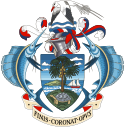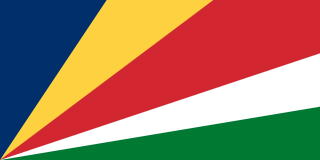
Seychelles, officially the Republic of Seychelles, is an island country and archipelagic state consisting of 115 islands in the Indian Ocean. Its capital and largest city, Victoria, is 1,500 kilometres east of mainland Africa. Nearby island countries and territories include the Comoros, Madagascar, Mauritius, and the French overseas departments of Mayotte and Réunion to the south; and Maldives and the Chagos Archipelago to the east. Seychelles is the smallest country in Africa as well as the least populated sovereign African country, with an estimated population of 100,600 in 2022.

The politics of Seychelles have historical roots in both one-party socialism and autocratic rule. Following independence from the United Kingdom in 1976, Seychelles was a sovereign republic until 1977, when the original President and leader of the Seychelles Democratic Party, James Mancham, was overthrown in a bloodless coup by the Prime Minister France-Albert René. René installed a single-party socialist state under the Seychelles People's Progressive Front in 1979 which remained in power until 1993, when multiparty elections took place for the first time since independence, after restoring the multi-party system in 1991. Modern day Seychelles governance takes place in a framework of a presidential republic, whereby the President of Seychelles is both head of state and head of government, and of a multi-party system. Executive power is exercised by the government. Legislative power is vested in both the government and the National Assembly.

The Seychelles People's Defence Force is the national military of Seychelles. It consists of a number of distinct branches: the Infantry Unit, Coast Guard, Air Force and a Presidential Protection Unit.

Seychelles follows a policy of what it describes as "positive" nonalignment and strongly supports the principle of reduced superpower presence in the Indian Ocean. Seychelles' foreign policy position has placed it generally toward the left of the spectrum within the Non-Aligned Movement. Russia, the United Kingdom, France, India, the People's Republic of China, Libya and Cuba maintain embassies in Victoria.

France-Albert René was a Seychellois lawyer, politician and statesman who served as the second President of Seychelles from 1977 to 2004. He also served as the country's second Prime Minister from its independence in 1976 to 1977.

The flag of Seychelles was adopted on 8 January 1996. The current flag is the third used by the country since its independence from the United Kingdom on 29 June 1976. The colours used in the current flag are the official colours of two of the country's major political parties: the Seychelles People's United Party and the Seychelles Democratic Party.

James Alix Michel, GCSK is a Seychellois politician who served as the third President of Seychelles from 2004 to 2016. He previously served as vice president under his predecessor, France-Albert René, from 1996 to 2004.

United Seychelles is a political party in Seychelles. It publishes a newspaper called The People. It was known as the Seychelles People's Progressive Front until June 2009, when it changed its name to the People's Party. The party changed its name again in November 2018, from the People's Party to United Seychelles.
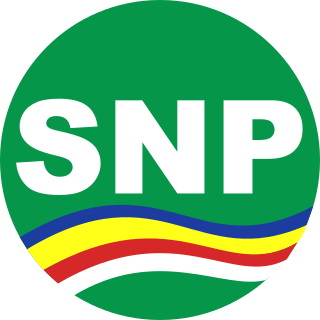
The Seychelles National Party(SNP) is a liberal political party in Seychelles. Its followers emphasize active multiparty democracy, respect for human rights and liberal economic reforms. It was founded in response to what it called the "totalitarian regime" of former President France-Albert René. It publishes a newsletter called Regar, which is frequently sued for libel by government officials. On Regar's front page of every issue is a quote from the constitution of Seychelles invoking their right to freedom of speech and freedom of expression.
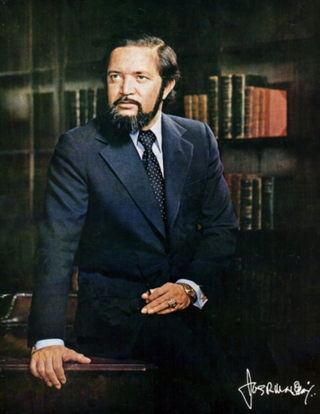
Sir James Richard Marie Mancham KBE was a Seychellois politician who founded the Seychelles Democratic Party and was the first President of Seychelles from 1976 to 1977.
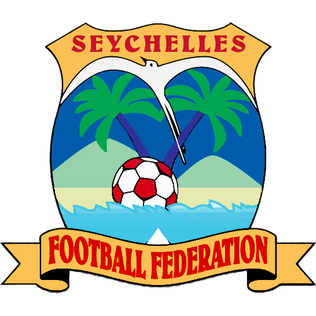
The Seychelles national football team, nicknamed the Pirates, represents Seychelles in international football and is controlled by the Seychelles Football Federation (SFF). SFF has been a member of the Confederation of African Football (CAF) and FIFA since 1986. The team's home stadium is the 10,000-capacity Stade Linité located in Roche Caiman in the outskirts of Victoria, the capital of Seychelles.

Franco-Seychellois are people of French descent living in the Seychelles. Franco-Seychellois have played an important role in the country's history both before and since independence.

The history of Seychelles dates back to the fourth of the Portuguese India Armadas led by Vasco da Gama, though Seychelles was likely already known to Arab navigators and other sailors for many centuries. On 15 March 1503, the scrivener Thomé Lopes noted the sighting of an elevated island, doubtless one of the granitic islands and almost certainly Silhouette Island. The first recorded landing was by the men of the English East India Company ship Ascension, which arrived in Seychelles in January 1609.The islands were claimed by France in 1756. Seychelles remained uninhabited until the first settlers arrived on board the ship Thélemaque, which arrived on 27 August 1770. Captain Leblanc Lecore landed the first colonists, comprising 15 white men, eight Africans and five Indians. The Seychellois Creole language developed as a means of communication between the different races. The British frigate Orpheus commanded by Captain Henry Newcome arrived at Mahé on 16 May 1794. Terms of capitulation were drawn up and the next day Seychelles was surrendered to Britain. Following the fall of Mauritius to British forces, Captain Phillip Beaver of the Nisus arrived at Mahé on 23 April 1811 and took possession of Seychelles as a permanent colony of Britain. The Seychelles became an independent republic in 1976. Following a coup d'état, a socialist one-party state ruled the country from 1977 to 1993. The subsequent democratic Presidential elections were won by candidates of the same party.

The 1977 Seychelles coup d'état was a virtually bloodless coup that occurred in the East African and Indian Ocean country of Seychelles on 4–5 June 1977. Between 60–200 supporters of the Seychelles People's United Party (SPUP), who had been training in Tanzania, overthrew President Sir James Mancham of the Seychelles Democratic Party (SDP) whilst he was attending the Commonwealth Heads of Government Meeting in London, the United Kingdom.

From 1977 to 1991, Seychelles was ruled by France-Albert René and the Seychelles People's Progressive Front as a one-party state. During this time the state built one of Africa's highest gross domestic products per capita.

The Seychelles Postal Service, is the public operator responsible for postal service in Seychelles.
